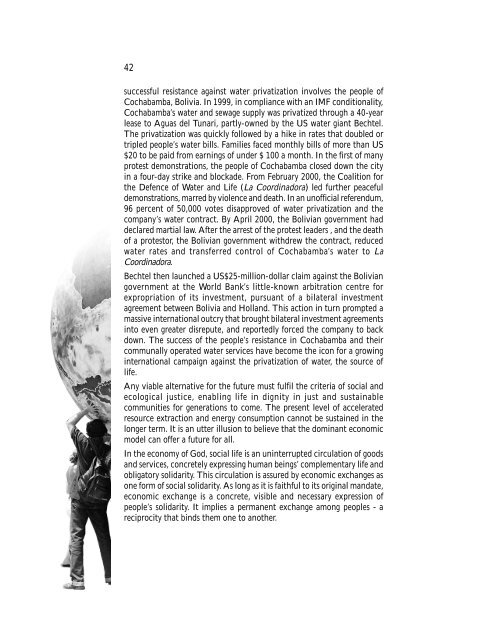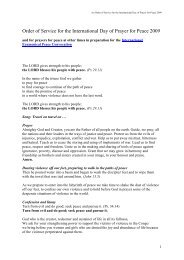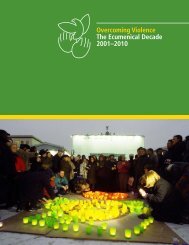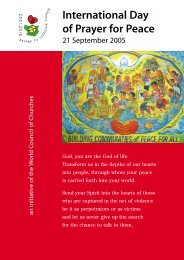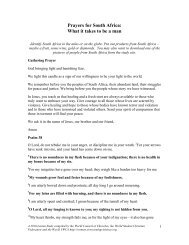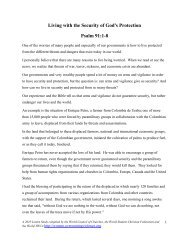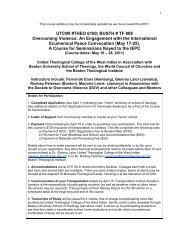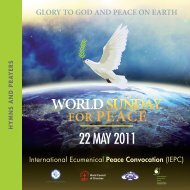Alternative Globalization Addressing Peoples and Earth
Alternative Globalization Addressing Peoples and Earth
Alternative Globalization Addressing Peoples and Earth
Create successful ePaper yourself
Turn your PDF publications into a flip-book with our unique Google optimized e-Paper software.
42<br />
successful resistance against water privatization involves the people of<br />
Cochabamba, Bolivia. In 1999, in compliance with an IMF conditionality,<br />
Cochabamba’s water <strong>and</strong> sewage supply was privatized through a 40-year<br />
lease to Aguas del Tunari, partly-owned by the US water giant Bechtel.<br />
The privatization was quickly followed by a hike in rates that doubled or<br />
tripled people’s water bills. Families faced monthly bills of more than US<br />
$20 to be paid from earnings of under $ 100 a month. In the first of many<br />
protest demonstrations, the people of Cochabamba closed down the city<br />
in a four-day strike <strong>and</strong> blockade. From February 2000, the Coalition for<br />
the Defence of Water <strong>and</strong> Life (La Coordinadora) led further peaceful<br />
demonstrations, marred by violence <strong>and</strong> death. In an unofficial referendum,<br />
96 percent of 50,000 votes disapproved of water privatization <strong>and</strong> the<br />
company’s water contract. By April 2000, the Bolivian government had<br />
declared martial law. After the arrest of the protest leaders , <strong>and</strong> the death<br />
of a protestor, the Bolivian government withdrew the contract, reduced<br />
water rates <strong>and</strong> transferred control of Cochabamba’s water to La<br />
Coordinadora.<br />
Bechtel then launched a US$25-million-dollar claim against the Bolivian<br />
government at the World Bank’s little-known arbitration centre for<br />
expropriation of its investment, pursuant of a bilateral investment<br />
agreement between Bolivia <strong>and</strong> Holl<strong>and</strong>. This action in turn prompted a<br />
massive international outcry that brought bilateral investment agreements<br />
into even greater disrepute, <strong>and</strong> reportedly forced the company to back<br />
down. The success of the people’s resistance in Cochabamba <strong>and</strong> their<br />
communally operated water services have become the icon for a growing<br />
international campaign against the privatization of water, the source of<br />
life.<br />
Any viable alternative for the future must fulfil the criteria of social <strong>and</strong><br />
ecological justice, enabling life in dignity in just <strong>and</strong> sustainable<br />
communities for generations to come. The present level of accelerated<br />
resource extraction <strong>and</strong> energy consumption cannot be sustained in the<br />
longer term. It is an utter illusion to believe that the dominant economic<br />
model can offer a future for all.<br />
In the economy of God, social life is an uninterrupted circulation of goods<br />
<strong>and</strong> services, concretely expressing human beings’ complementary life <strong>and</strong><br />
obligatory solidarity. This circulation is assured by economic exchanges as<br />
one form of social solidarity. As long as it is faithful to its original m<strong>and</strong>ate,<br />
economic exchange is a concrete, visible <strong>and</strong> necessary expression of<br />
people’s solidarity. It implies a permanent exchange among peoples - a<br />
reciprocity that binds them one to another.


